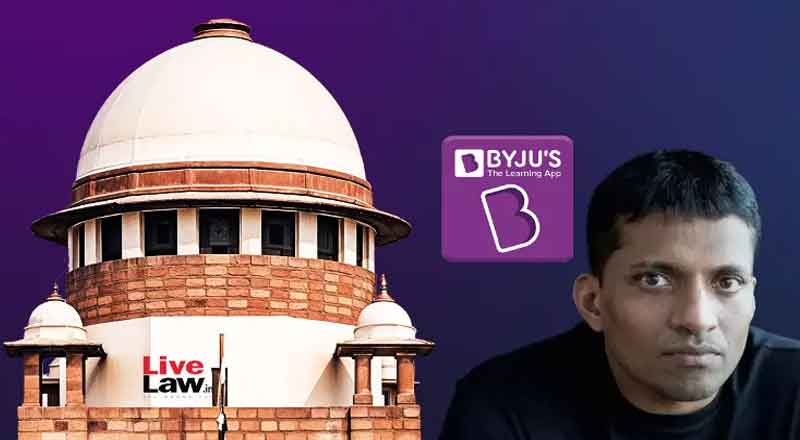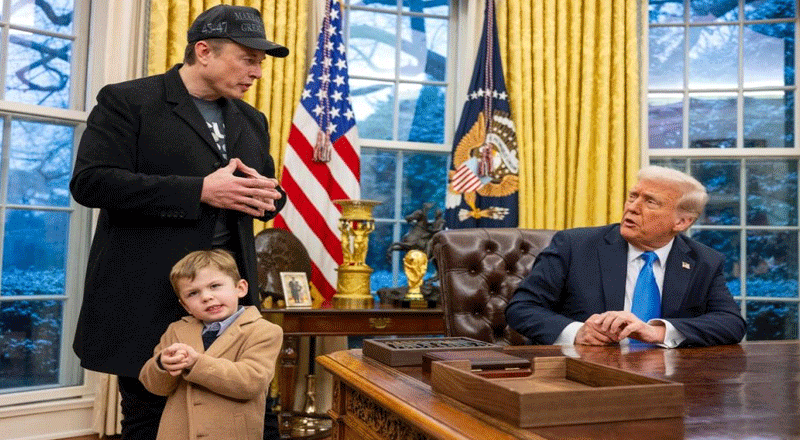The ongoing insolvency proceedings against the ed-tech giant Byju’s have taken a significant turn, with the Supreme Court of India ordering a temporary halt in the process. On Thursday, the Court reserved its verdict on an appeal filed by the US-based financial creditor Glas Trust, which is challenging the decision of the National Company Law Appellate Tribunal (NCLAT) to stop insolvency proceedings against Think & Learn Pvt. Ltd., the parent company of Byju’s. The case raises critical questions about financial responsibility, corporate governance, and the role of Indian insolvency laws.
Court’s Interim Directive: Status Quo Ordered
A bench led by Chief Justice of India (CJI) DY Chandrachud, along with Justices JB Pardiwala and Manoj Misra, ordered the interim resolution professional to maintain the status quo and suspend any meetings of the committee of creditors (CoC). The decision comes after the Court expressed doubts over NCLAT’s handling of the case. The Court questioned whether the tribunal had thoroughly examined the implications of halting the insolvency process, particularly concerning creditors other than the Board of Control for Cricket in India (BCCI).
The Court’s interim order stated, “Until the judgment is pronounced, the interim resolution professional shall maintain status quo and shall not hold any meeting of the committee of creditors.”
NCLAT’s Decision and Glas Trust’s Challenge
The case’s origins trace back to June 2023, when the National Company Law Tribunal (NCLT) in Bengaluru initiated insolvency proceedings against Byju’s following a petition by the BCCI, which claimed that the company owed it ₹158 crore under a sponsorship deal for the Indian cricket team. In response, the NCLAT later halted the proceedings after Byju’s reached a settlement with the BCCI. As part of the settlement, Riju Raveendran, the brother of Byju’s founder Byju Raveendran, committed to repaying the debt from his personal funds.
However, this move drew objections from Glas Trust, a financial creditor based in the United States. Glas Trust raised concerns that Byju’s was using funds intended for creditors like them to settle its debt with the BCCI. On August 14, the Supreme Court stayed NCLAT’s decision and revived the insolvency proceedings. The Court’s concerns centered on the broader financial liabilities of Byju’s, which reportedly stands at ₹15,000 crore in debt.
Questioning the Selective Settlement
One of the central issues in the case is the selective settlement made by Byju’s with the BCCI while other creditors remain unpaid. The Court, led by CJI Chandrachud, questioned why Byju’s chose to settle only with the BCCI, particularly when the company owes substantial debts to other creditors. The bench remarked, “The company is in debt of ₹15,000 crore. When the quantum of the debt is so large, can one creditor (BCCI) walk away saying one promoter is ready to pay me?”
This selective settlement raises broader concerns about corporate governance and whether Byju’s is acting in good faith towards all its creditors. The Court has indicated that it may send the case back to NCLAT for a fresh decision, expressing doubts over whether the tribunal had fully considered the interests of all stakeholders.
Legal Arguments and Key Players
During the hearing, Solicitor General Tushar Mehta, representing the BCCI, argued that certain provisions in the Insolvency and Bankruptcy Code (IBC) incentivize settlements between corporate debtors and creditors. Mehta pointed out that settlements are often encouraged to prevent a situation where all debts are enforced simultaneously, which could lead to the company’s collapse.
However, Senior Advocate Kapil Sibal, representing Glas Trust, opposed the CoC meeting that was scheduled for the same day. He emphasized the misconduct of Byju’s and questioned the legitimacy of holding a CoC meeting while insolvency regulations were being challenged. “There must be complete status quo on this. The CoC meeting cannot be held at 4 pm today,” Sibal argued.
Senior advocates Shyam Divan and Kapil Sibal, along with a team of legal experts, represented Glas Trust, while Senior Advocates AM Singhvi and Neeraj Kishan Kaul appeared for Byju’s. The BCCI was represented by Solicitor General Tushar Mehta, assisted by Kanu Agrawal, with a briefing by Argus Partners.
Byju’s Financial Troubles and the Role of NCLAT
Byju’s financial woes have been a significant concern, with the company amassing ₹15,000 crore in debt. The insolvency proceedings were initiated following the BCCI’s petition, but NCLAT’s decision to close the case after the BCCI’s settlement has come under scrutiny. Glas Trust’s objection to this settlement, which it labeled as “tainted,” brought the case to the Supreme Court’s attention.
The NCLAT’s relief to Byju’s, granted on August 2, gave a temporary respite to the company and its founder Byju Raveendran. However, the Supreme Court’s intervention on August 14 has now put that relief on hold. The Court ordered that the ₹158.9 crore settlement amount paid to the BCCI be kept in a separate bank account, pending further proceedings.
Supreme Court’s Upcoming Verdict
As the Supreme Court deliberates on the case, the future of Byju’s and its massive debt remains uncertain. The Court’s decision will not only impact Byju’s financial future but will also set a precedent for how Indian insolvency laws handle selective settlements with creditors. The involvement of Glas Trust, a significant financial creditor, has added a layer of complexity to the case, making the Court’s upcoming verdict highly anticipated.
In the meantime, the status quo will be maintained, and no further actions will be taken by the CoC until the Supreme Court delivers its judgment. The case underscores the challenges facing India’s corporate governance and insolvency processes, especially when it involves large-scale debt and international financial creditors.
(With inputs from agencies)





